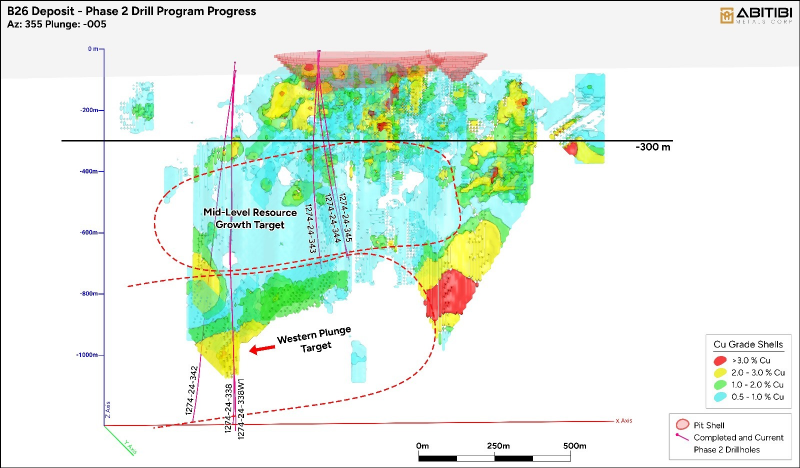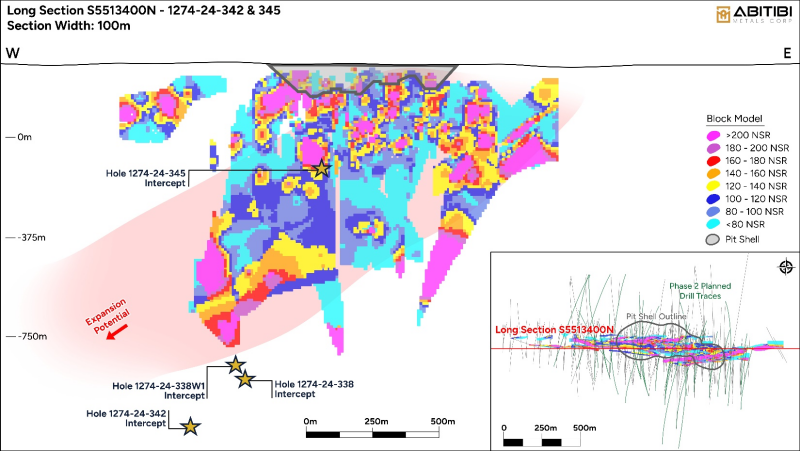Archive
Abitibi Metals adds Second Drill Rig to Phase II Program at the B26 Deposit
 | |||||||||
 |  | ||||||||
Highlights:
-
Second Drill Rig Added: Phase 2 drill program is targeting 16,500 metres with the aim of building credibility for an exploration target supporting our vision to define a 30 – 50 million tonne resource at B26.
-
Major Step-Out Drilling: The first rig is currently drilling an up to 400-metre step-out hole (1274-24-342) to test the Western Plunge downdip that would expand known mineralization including 5.08% Cu Eq over 7.1 metres in 1274-16-236.
-
Significant Mineralization Encountered: Initial drilling from Phase II has shown strong chalcopyrite stringer mineralization over 81 metres, with the deepest intercept in the Project's history identified in the first hole (1274-23-338, see news release dated September 5, 2024). This coupled with the recently drilled wedge (1274-23-338-W1), which indicates strong mineralization composed of chalcopyrite stringers developed against late-tectonic quartz veining, highlights significant potential for resource expansion.
October 1, 2024 / TheNewswire / London, Ontario – Abitibi Metals Corp. (CSE:AMQ) (OTC:AMQFF) (FSE:FW0) (“Abitibi” or the “Company”) is pleased to announce that the Company has added a second drill rig at its high-grade Polymetallic B26 Deposit (“B26” or the “Deposit”) located in the province of Quebec, Canada. Abitibi is currently completing its Phase II drill program, where 16,500 metres is targeted by the end of year. On November 16th, 2023, the Company entered into an option agreement on the B26 Deposit to earn 80% over 7 years from SOQUEM Inc (see news release dated November 16, 2023).
“We are excited to announce the arrival of a second drill for our Phase 2 drill program at the B26 Deposit,” stated Jonathon Deluce, CEO and President of Abitibi Metals. “The addition of this drill underscores our commitment to accelerating the exploration process and building credibility for our target size of 30 – 50 million tonnes at B26. With Phase 1 having successfully extended mineralization close to surface, this second drill will allow us to further test high-priority targets across the Mid-Level and Western Plunge Targets. Currently the first rig is drilling 1274-24-342 which is an important up to 400 metre step-out to test the western-plunge downdip."
Mr. Deluce continued. “The first hole of Phase II (338) is the deepest intercept in the Project’s history. Pending positive assays, we look forward to cost effectively continuing to expand the mineralized zones with additional directional drilling at multiple levels covering the western plunge target.”
Mr. Deluce continued, “While some shareholders may have concerns about the current drilling depth, it's important to emphasize that given the size and scale of our target, this depth is still considered shallow for a potential underground mine. When comparing the alteration signature to other significant deposits in the Abitibi region, the potential for B26 suggests a much deeper system, making this drilling phase essential for fully understanding the deposit's potential.”
Drill Update:
To-date, three holes and a wedge have been completed, covering both the Western Plunge and Mid-Level Resource targets, totalling 3,385 metres. Details on the two holes currently underway:
-
Drill #1: Currently drilling 1274-24-342 with a planned total length of 1,500 metres (Approximately 1,400 vertical). This hole is planned to test the Western Plunge target with an up to 400 metre step-out from 1274-16-236, which intercepted 5.08% Cu Eq over 7.1 metres. Pending an assessment of assays, this hole is well located to drill wedges or directional holes to cover the western plunge at multiple levels.
-
Drill #2: Currently drilling 1274-24-345 with a planned total length of 600 metres. This hole is planned to test the Mid-Level Resource target approximately 100 metres away from 1274-13-97 which intercepted 2.86% Cu Eq over 4.7 metres.
Core Observation:
Core observations from hole 1274-23-338 and wedge 1274-23-338-W1 showed strong mineralization composed of chalcopyrite stringers developed against late-tectonic quartz veining. Hole 1274-338-W1 (Wedge from 338) intercepted 71 metres of chalcopyrite stringer mineralization with concentrations varying between 2% and 20% chalcopyrite over metric intervals forming a zone from 1159.4 to 1230 metres.
Holes 1274-24-338 and 1274-24-338-W1 intersected the mineralized zone respectively at a depth of 1,100 and 1,050 metres from surface, supporting the western plunge thesis.
Figure 1 – Phase 2 Target Overview. There are two priority targets for this phase – the Mid-Level Resource Growth Target and the Western Plunge Target – where limited drilling has occurred. Developing these targets will be a focus as Abitibi works to define its vision for a 30 to 50 million tonne resource at B26.
Figure 2 – Drill Hole Location. Notable intercepts from Phase 2 are shown. Abitibi is focused on expanding the historical resource along strike and downdip.
|
Table 1: Drill Coordinates |
|||||||
|
Drill Hole Number |
Target |
UTM East |
UTM North |
Azimuth |
Dip |
Depth (m) |
Status |
|
1274-24-338 |
Western Plunge |
652368 |
5513881 |
200 |
-77 |
1,422 |
Complete |
|
1274-24-338W |
Western Plunge |
652368 |
5513881 |
171.1 |
-56.24 |
Wedge Start – 900m Depth – 1,476 |
Complete |
|
1274-24-342 |
Western Plunge |
652368 |
5513885 |
215 |
-75 |
1,500 |
In-Progress |
|
1274-24-343 |
Mid-Level |
652703 |
5513213 |
340 |
-72 |
750 |
Complete |
|
1274-24-344 |
Mid-Level |
652703 |
5513213 |
350 |
-68 |
637 |
Complete |
|
1274-24-345 |
Mid-Level |
652700 |
5513215 |
360 |
-65 |
600 |
In-Progress |
Qualified Person
This press release was reviewed and approved by Martin Demers, P.Geo., OGQ No. 770, who is a qualified person as defined under National Instrument 43-101, and responsible for the technical information provided in this news release.
About Abitibi Metals Corp.:
Abitibi Metals Corp. is a Quebec-focused mineral acquisition and exploration company focused on the development of quality base and precious metal properties that are drill-ready with high-upside and expansion potential. Abitibi’s portfolio of strategic properties provides target-rich diversification and includes the option to earn 80% of the high-grade B26 Polymetallic Deposit, which hosts a historical resource estimate1 of 7.0MT @ 2.94% Cu Eq (Ind) & 4.4MT @ 2.97% Cu Eq (Inf), and the Beschefer Gold Project, where historical drilling has identified 4 historical intercepts with a metal factor of over 100 g/t gold highlighted by 55.63 g/t gold over 5.57 metres and 13.07 g/t gold over 8.75 metres amongst four modeled zones.
About SOQUEM:
SOQUEM, a subsidiary of Investissement Québec, is dedicated to promoting the exploration, discovery and development of mining properties in Quebec. SOQUEM also contributes to maintaining strong local economies. Proud partner and ambassador for the development of Quebec’s mineral wealth, SOQUEM relies on innovation, research and strategic minerals to be well-positioned for the future.
ON BEHALF OF THE BOARD
Jonathon Deluce, Chief Executive Officer
For more information, please call 226-271-5170, email info@abitibimetals.com, or visit https://www.abitibimetals.com.
The Company also maintains an active presence on various social media platforms to keep stakeholders and the general public informed and encourages shareholders and interested parties to follow and engage with the Company through the following channels to stay updated with the latest news, industry insights, and corporate announcements:
Twitter: https://twitter.com/AbitibiMetals
LinkedIn: https://www.linkedin.com/company/abitibi-metals-corp-amq-c/
Neither the Canadian Securities Exchange nor its Regulation Services Provider accepts responsibility for the adequacy or accuracy of this release.
Note 1: A qualified person has not done sufficient work to classify the historical estimate as current mineral resources or mineral reserves. The issuer is not treating the historical estimate as current mineral resources or mineral reserves. Source: Rapport Technique NI 43-101 Estimation des Ressources Projet B26, Québec, For SOQUEM Inc., By SGS Canada Inc., Yann Camus, ing., Olivier Vadnais-Leblanc, géo., SGS Canada – Geostat., Effective Date: April 18, 2018, Date of Report : May 11, 2018
Note 2: Copper equivalent values calculated using metal prices of $4.00/lb Cu, $1.50/lb Zn, $20.00/ounce Ag and $1,800/ounce Au. Recovery factors were applied according to SGS CACGS-P2017-047 metallurgical test: 98.3% for copper, 90% for gold, 96.1% for zinc, 72.1% for silver.
Forward-looking statement:
This news release contains certain statements, which may constitute “forward-looking information” within the meaning of applicable securities laws. Forward-looking information involves statements that are not based on historical information but rather relate to future operations, strategies, financial results or other developments on the B26 Project or otherwise. Forward-looking information is necessarily based upon estimates and assumptions, which are inherently subject to significant business, economic and competitive uncertainties and contingencies, many of which are beyond the Company’s control and many of which, regarding future business decisions, are subject to change. These uncertainties and contingencies can affect actual results and could cause actual results to differ materially from those expressed in any forward-looking statements made by or on the Company’s behalf. Although Abitibi has attempted to identify important factors that could cause actual actions, events or results to differ materially from those described in forward-looking information, there may be other factors that cause actions, events or results to differ from those anticipated, estimated or intended. All factors should be considered carefully, and readers should not place undue reliance on Abitibi’s forward-looking information. Generally, forward-looking information can be identified by the use of forward-looking terminology such as “expects,” “estimates,” “anticipates,” or variations of such words and phrases (including negative and grammatical variations) or statements that certain actions, events or results “may,” “could,” “might” or “occur. Mineral exploration and development are highly speculative and are characterized by a number of significant inherent risks, which may result in the inability of the Company to successfully develop current or proposed projects for commercial, technical, political, regulatory or financial reasons, or if successfully developed, may not remain economically viable for their mine life owing to any of the foregoing reasons, among others. There is no assurance that the Company will be successful in achieving commercial mineral production and the likelihood of success must be considered in light of the stage of operations.

